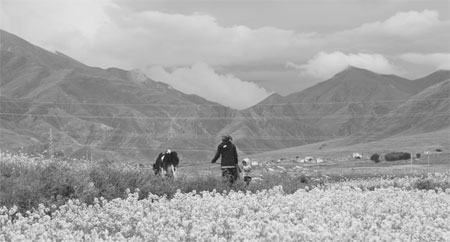Forum seeks advice on Tibet's sustainable growth
Protecting Tibet's ecology is China's responsibility to the world. Making a happy life for the Tibetans is China's duty to itself and keeping a good balance between the two is central to Tibet's sustainable development.
The government of Tibet autonomous region and the State Council Information Office (SCIO) co-hosted a forum on the development in Tibet early this month in Lhasa, the administrative capital of Tibet autonomous region.
It was the first time a Chinese authority had turned to foreigners for suggestions on Tibet's development model. After briefing the audience on the development of Tibet in recent years, the hosts showed an inclusive attitude while candidly listening to advice on Tibet's future development.
Although the speakers come from different backgrounds of government, universities and the media representing 36 countries and regions, they came to an agreement that developing carefully chosen industries properly, improving people's livelihoods, and protecting the environment and cultural diversity are central to Tibet's sustainable development.
To shun setbacks and detours, Tibet can draw valuable lessons from the pollution in the better-off eastern and central China, and actively absorb developed economies' knowledge on balancing industrial prosperity and environmental protection through international cooperation.
The forum offered a face-to-face exchange opportunity for Tibet officials and foreign advisers who are keen to show how their countries take the sustainable development path.
Despite this, I think the forum could have been more productive if the hosts could have encouraged more professional and in-depth discussions on some pressing issues for Tibet. For instance, what industries fit Tibet, and how should the industries be planned and operated in a region that is unique for global ecology and climate change?
Industries should not be demonized as the sole cause of environmental degradation if they are properly planned and operated. China has accumulated a lot of painful lessons in this regard.
Tibet has a good foundation to continue its green development. Thanks to the central government's assistance, the Tibetan people's livelihoods improved after the 1959 democratic reform that ended the serf system.
From 1952 to 2012, the central government's input accounted for 96 percent of the Tibet government's expenditures, let alone the assistance from the other local governments. The Tibetan economy increased six-fold over the past 10 years and the life expectancy of Tibetans doubled in 40 years.
Unlike the other parts of China, Tibet has not compromised its environment and ecology for the material progress.
Moreover, the Tibetan culture and religion attach great importance to cherishing the holy mountains and waters on the plateau which shares similar core values of the sustainable development.
It is much easier in Tibet to drive home the message that money is valueless compared with good environment than in other parts of China.
One unique advantage for Tibet continuing its green growth is that the plateau catches worldwide attention because of its unique natural and religious positions.
As the speakers at the forum said, a lot of advanced research institutes, international companies, international organizations and non-government organizations are ready to help China to realize Tibet's sustainable development, if needed.
And the high efficiency of implementation of China's government system is another factor convincing many speakers that as long as the Chinese leaders want to keep Tibet clean and prosperous, they can do so.
The airports, roads and railways greatly improved Tibet's connectivity with the world. So far, every penny spent on Tibet's infrastructure is a worthwhile investment for Tibet's development in the long run.
Losang Jamcan, head of the Tibet government, announced ambitious industrial development plans at the forum and indicated the Tibetan government will be more financially independent through industrializing some special industries, agriculture, husbandry and tourism. He also emphasized that the government will protect the environment and ecology of Tibet just as we protect our eyes.
If Tibet can realize its sustainable development, it will set a good example on balancing growth and nature for similar places with weak ecological systems and diverse cultures.
liyang@chinadaily.com.cn
|
Tibet remains the most virgin land in China. Most assistance fund from the rest of China goes to infrastructures of electricity, water, transportation, housing and education on the plateau. Da Qiong / China Daily |



















